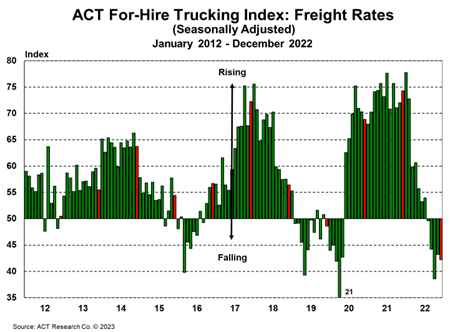Freight rates dipped again in December, but rebound may be near for trucking cycle
Pricing power shifted to shippers in 2022, but equipment demand is still “red hot,” ACT Research says.

Freight trucking rates continued to decline in December, but a new report from ACT Research says that this “soft patch” in the numbers suggests that the negative cycle may be more than halfway complete, forecasting that a turnaround for carriers could be on the horizon.
The statistics come from ACT’s For-Hire Trucking Index, a monthly survey of for-hire trucking service providers which converts responses into diffusion indexes, where the neutral or flat activity level is 50. The latest figures showed the fourth straight month—and seventh out of the last eight months—of declining rates.
“Pricing power clearly shifted to shippers in 2022, but the recent stabilization hints the bottoming process is beginning. Capacity continues to grow, with pent-up equipment demand still red hot, and freight demand is down, leaving the market balance loose near-term,” Tim Denoyer, ACT’s vice president & senior analyst, said in a release.
A similar pattern played out in freight volumes over the same period, the Columbus, Indiana-based firm found. “We’re now nine months into this freight volume soft patch with lower goods spending, overstocked retail inventories, and declining imports. The good news is that from a historical perspective, that means we’re closer to the end than the start,” Denoyer said.
Another sign of optimism in the future of the freight market came from statistics on the number of U.S. trailer net orders, as tracked by the Bloomington, Indiana-based freight analysis firm FTR.
Trailer orders in December jumped a new monthly record of 56,949 units, which barely eclipsed the previous record set in October 2020. Order activity for the month was up an “astounding” 121% versus December 2021, FTR said.
“The surge in orders is unlikely to be sustained going forward, and we have already seen strong moderation in Class 8 orders,” Jonathan Starks, FTR's chief executive officer and chief intelligence officer, said in a release. “However, we have now seen more than 347,000 orders placed over the last 12 months, and backlogs are at their highest level in nearly two years. 2023 is starting on solid footing even as the macro uncertainty remains extremely elevated.”
Related Articles
Copyright ©2024. All Rights ReservedDesign, CMS, Hosting & Web Development :: ePublishing